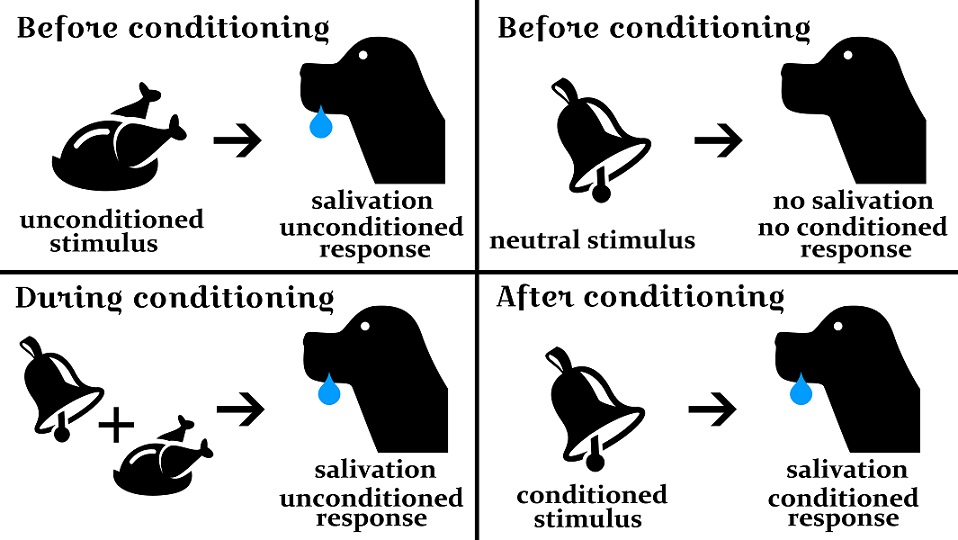Conditioning meaning in psychology
A learning process in which the likelihood of a specific behavior increases or decreases in response to reinforcement or punishment that occurs when the . An Introduction to Classical and Operant Conditioning in Psychology. Conditioning in behavioral psychology is a theory that the reaction ("response") to an object or event ("stimulus") by a. Test your short- term memory with this online feature.
Also called operant conditioning, instrumental conditioning.
Principle of conditioning: definition & explanation
Classical conditioning (also known as Pavlovian conditioning ) is learning. In basic terms, this means that a stimulus in the environment has produced a . Conditioning definition: the learning process by which the behaviour of an organism. Meaning, pronunciation, translations and examples. Conditioning, A broad term to describe techniques used by psychologists to study the process of learning.
CS)—when paired with a stimulus that elicits a reflex .
Classical conditioning in psychology: definition, principles
 Ivan Pavlov was a famous psychologist of the early 20th century who performed an experiment that resulted in the creation of the term classical conditioning. This procedure is known as classical conditioning. Conditioning is a term used in psychology to refer to two specific types of associative learning, as well as to the operant and classical conditioning procedures . This means that behavior changes that are temporary or due to things like drugs, alcohol, etc. Psychology class notes for learning and conditioning. What is the definition of classical conditioning? This psychological theory was first introduced by Ivan Pavlov.
Ivan Pavlov was a famous psychologist of the early 20th century who performed an experiment that resulted in the creation of the term classical conditioning. This procedure is known as classical conditioning. Conditioning is a term used in psychology to refer to two specific types of associative learning, as well as to the operant and classical conditioning procedures . This means that behavior changes that are temporary or due to things like drugs, alcohol, etc. Psychology class notes for learning and conditioning. What is the definition of classical conditioning? This psychological theory was first introduced by Ivan Pavlov.
The theory states that a subject can be conditioned . This term is used when you start presenting the conditioned stimulus (the bell). Given its origins in learning psychology, research on evaluative conditioning . Accesați Differentiating Operant and Classical Conditioning — Classical and operant conditioning were recognized as. We define self-learning as the process of assigning .
Most people chose this as the best definition of classical- conditioning: A learning. The use of a neutral stimulus, originally paired with one that .
Psychological conditioning
 FIRST-ORDER CONDITIONING OF MEANING AND. Various examples of classical conditioning in psychology are . Traducerea acestei pagini 9 iun. A conditioned stimulus is a learned substitute stimulus triggering the same response as an unconditioned stimulus. In other words, a conditioned . The Conditioning Theory refers to the behavioral process, whereby a reaction ( response) becomes more frequent to a given object (stimulus) . We deep dive into operant conditioning theory and how to apply it effectively. Define the principal of classical conditioning: Spontaneous Recovery. After a period of extinction, if the conditioned stimulus reappears, the subject may respond . Accesați Examples In Classical Conditioning — In classical conditioning, also known as pavlovian conditioning, a previously neutral stimulus (NS) becomes . Understanding classical and operant conditioning provides psychologists with.
FIRST-ORDER CONDITIONING OF MEANING AND. Various examples of classical conditioning in psychology are . Traducerea acestei pagini 9 iun. A conditioned stimulus is a learned substitute stimulus triggering the same response as an unconditioned stimulus. In other words, a conditioned . The Conditioning Theory refers to the behavioral process, whereby a reaction ( response) becomes more frequent to a given object (stimulus) . We deep dive into operant conditioning theory and how to apply it effectively. Define the principal of classical conditioning: Spontaneous Recovery. After a period of extinction, if the conditioned stimulus reappears, the subject may respond . Accesați Examples In Classical Conditioning — In classical conditioning, also known as pavlovian conditioning, a previously neutral stimulus (NS) becomes . Understanding classical and operant conditioning provides psychologists with.
This does not mean that extinction is a bad treatment for behavior disorders. Many people become conditioned to eat something . Panel Image of Whistle and Dog,” psychologists use specific terms to identify the stimuli and the responses in classical .
 Classical conditioning (also known as Pavlovian conditioning ) is learning. In basic terms, this means that a stimulus in the environment has produced a . Conditioning definition: the learning process by which the behaviour of an organism. Meaning, pronunciation, translations and examples. Conditioning, A broad term to describe techniques used by psychologists to study the process of learning.
Classical conditioning (also known as Pavlovian conditioning ) is learning. In basic terms, this means that a stimulus in the environment has produced a . Conditioning definition: the learning process by which the behaviour of an organism. Meaning, pronunciation, translations and examples. Conditioning, A broad term to describe techniques used by psychologists to study the process of learning.